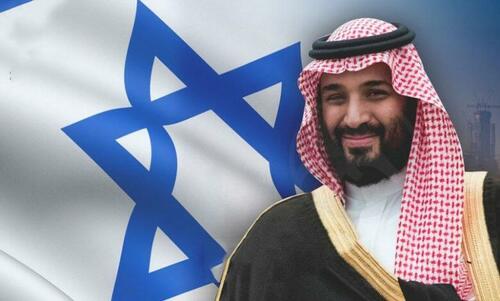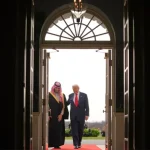
After Israel-Saudi normalization efforts based on the US-brokered Abraham Accords appeared stalled for the past several months, The Wall Street Journal on Wednesday has reported an apparent breakthrough.
"U.S. and Saudi Arabia have agreed on the broad contours of a deal for Saudi Arabia to recognize Israel in exchange for concessions to the Palestinians, U.S. security guarantees and civilian nuclear help, according to U.S. officials," the report says.
Two weeks ago Saudi Crown Prince Mohammed bin Salman met with Biden's national security advisor Jake Sullivan in Jeddah. These efforts to mend rocky US-Saudi ties of late have been ongoing, as Riyadh has failed to cooperation with the White House's energy and oil production demands.
Additionally, the Saudis have reportedly pressed for their own nuclear energy program and domestic uranium production, reportedly having told Washington that approval is key if the Abraham Accords are to ever extend to the kingdom.
Progress in this arena has been largely stalled against the backdrop of escalating violence between Israeli security forces and the Palestinians.
But the WSJ report indicates this and other geopolitical points of tensions will be what is hammered out over the course of the coming nine to twelve months:
The Saudis are also seeking significant concessions from Israel that would help promote the creation of a Palestinian state. In return, the U.S. is pressing Saudi Arabia to impose limits on its growing relationship with China
“There’s a work plan to explore the elements of what this would be and test the boundaries of what’s possible,” said one senior U.S. official.
But crown prince MbS has been unpredictable of late, sometimes issuing seemingly contradictory statements on the prospect of peace for Israel. This could be in part because his domestic audience - and that of the broader Arab public - is set against any peace or normalization with the Jewish state.
US deal to broker Saudi - Israel peace. Surely US will want lower oil prices, and Saudi distancing itself from Russia and China. Jeddah Ukraine summit part of deal?
— Timothy Ash (@tashecon) August 9, 2023
The Saudis have also made peace with Iran, which could also be a source of tensions with Tel Aviv. The Israelis see Tehran as a perpetual enemy and existential threat which should not be negotiated with. During the height of the war in Syria, the Saudis and Israelis cooperated behind the scenes on intelligence-sharing as both spearheaded efforts to overthrow President Assad.
But China's inroads and success in brokering the Iran-Saudi détente is surely driving this latest White House effort to secure a Saudi-Israel deal. As China moves in, Washington will try and bolster its influence, to ensure a Mideast political order on its own terms.
After Israel-Saudi normalization efforts based on the US-brokered Abraham Accords appeared stalled for the past several months, The Wall Street Journal on Wednesday has reported an apparent breakthrough.
“U.S. and Saudi Arabia have agreed on the broad contours of a deal for Saudi Arabia to recognize Israel in exchange for concessions to the Palestinians, U.S. security guarantees and civilian nuclear help, according to U.S. officials,” the report says.
Two weeks ago Saudi Crown Prince Mohammed bin Salman met with Biden’s national security advisor Jake Sullivan in Jeddah. These efforts to mend rocky US-Saudi ties of late have been ongoing, as Riyadh has failed to cooperation with the White House’s energy and oil production demands.
Additionally, the Saudis have reportedly pressed for their own nuclear energy program and domestic uranium production, reportedly having told Washington that approval is key if the Abraham Accords are to ever extend to the kingdom.
Progress in this arena has been largely stalled against the backdrop of escalating violence between Israeli security forces and the Palestinians.
But the WSJ report indicates this and other geopolitical points of tensions will be what is hammered out over the course of the coming nine to twelve months:
The Saudis are also seeking significant concessions from Israel that would help promote the creation of a Palestinian state. In return, the U.S. is pressing Saudi Arabia to impose limits on its growing relationship with China
“There’s a work plan to explore the elements of what this would be and test the boundaries of what’s possible,” said one senior U.S. official.
But crown prince MbS has been unpredictable of late, sometimes issuing seemingly contradictory statements on the prospect of peace for Israel. This could be in part because his domestic audience – and that of the broader Arab public – is set against any peace or normalization with the Jewish state.
US deal to broker Saudi – Israel peace. Surely US will want lower oil prices, and Saudi distancing itself from Russia and China. Jeddah Ukraine summit part of deal?
— Timothy Ash (@tashecon) August 9, 2023
The Saudis have also made peace with Iran, which could also be a source of tensions with Tel Aviv. The Israelis see Tehran as a perpetual enemy and existential threat which should not be negotiated with. During the height of the war in Syria, the Saudis and Israelis cooperated behind the scenes on intelligence-sharing as both spearheaded efforts to overthrow President Assad.
But China’s inroads and success in brokering the Iran-Saudi détente is surely driving this latest White House effort to secure a Saudi-Israel deal. As China moves in, Washington will try and bolster its influence, to ensure a Mideast political order on its own terms.
Loading…






